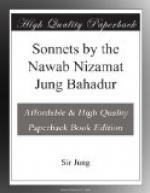BY RICHARD CHARLES FRASER
The following Sonnet Sequence,—written during rare intervals of leisure in a busy and strenuous life,—was privately printed in Madras early in 1914, without any intention of publication on the part of the author. He has, however, now consented to allow it to be given to a wider audience; and we anticipate in many directions a welcome for this small but significant volume by the writer of India to England, one of the most popular and often-quoted lyrics evoked by the Great War.
The Nawab Nizamat Jung Bahadur, was born in the State of Hyderabad, but educated in England; and there are some—at Cambridge and elsewhere—who will remember his keenly discriminating interest in British history and literature, and the comprehensive way he, in a few words, would indicate his impressions of poets and heroes, long dead, but to him ever-living.
His appreciation was both ardent and just; he could swiftly recognise the nobler elements in characters which at first glance might seem startlingly dissimilar; and he could pass without apparent effort from study of the lives of men of action to the inward contemplations of abstruse philosophers.
To those who have not met him, it may appear paradoxical to say that his tastes were at the same moment acutely fastidious and widely sympathetic; but anyone who has talked with him will recall the blend of high impersonal ideas with a remarkable personality which seldom failed to stimulate other minds—even if those others shared few if any of his intellectual tastes.
A famous British General (still living) was once asked, “What is the most essential quality for a great leader of men?” And he replied in one word “Sympathy.” The General was speaking of leadership in relation to warfare; and by “Sympathy” he meant swift insight into the minds of others; and, with this insight, the power to arouse and fan into a flame the spark of chivalry and true nobility in each. The career of the Nawab Nizamat Jung has not been set in the world of action,—he is at present a Judge of the High Court in Hyderabad,—but nevertheless this definition of sympathy is not irrelevant, for the Nawab’s personal influence has been more subtle and far-reaching than he himself is yet aware. His love of poetry and history, if on the one hand it has intensified his realisation of the sorrows and tragedies of earthly life, on the other hand has equipped him with a power to awake in others a vivid consciousness of the moral value of literature,—through which (for the mere asking) we any of us can find our way into a kingdom of great ideas. This kingdom is also the kingdom of eternal realities—or so at least it should be; and those who in the early nineties in England talked with Nizamoudhin (as he then was) could scarcely fail to notice that he valued the genius of an author, or the exploits of a character in history, chiefly in proportion to the permanent and vital nature of the truths this character had laboured to express—whether in words or action.




